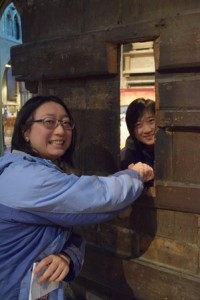32 Divided by a Common Language, the Third
Posted by Christine on Jan 26, 2015 in Ireland | 0 comments
I love encountering new-to-me slang words that have become so widely used and respectable they appear in the newspaper; though it must be said, Irish newspapers are more willing to use “language” than their American counterparts. An article in The Irish Times the other day said “the milk had a pong to it….” I had to look up “pong” used that way, though context did help. It means an offensive or bad odor, of course. And though the origin may be a Romani word “pan” meaning the same thing, you can imagine how a bad odor might pong like a ping-pong ball from the source to your nose.
An expression I’ve heard in many contexts since living in Ireland—most notably from two scholars speaking as part of a Dublin History Festival panel on Ireland and Word War I—is “We made a hames of it.” As context suggests, it means “We made a mess of it,” but where does the word “hames” come from and how did this usage come to be? SpellCheck certainly doesn’t like the word, but it’s a legitimate thing. The Encyclopedia Britannica online explains it this way: “A hames collar is heavily padded; iron projections (hames) at its top contain eyepieces for the traces.” As the great-great granddaughter of an Irish born “master harness-maker,” I should probably have known that (see my blog post “12 Nicholas Cozzens, Co. Wexford, Ireland”). Michael Quinion in his fascinating blog “World Wide Words: Investigating the English language across the globe” has more to say about the word and the expression, but he and others note that the phrase “made a hames of it” is pretty much confined to Ireland. While the logical path from a feature of a horse collar to the meaning of the expression is a little meandering, you can see how important it would be NOT to mess up the way the traces attach to the horse’s collar via the hames: a mistake in this delicate operation could certainly lead to an accident and whoever harnessed the horse being charged with “making a hames of it.”
A usage I have encountered frequently since coming to Ireland and enthusiastically incorporated into my own speaking is “deadly” meaning “really good” or “fantastic.” “What did you think of the pizza? “Deadly!” or “She’s a deadly fiddle player.” “Lethal” can be used in the same way. The word “dead” has long been associated with accuracy as in “dead center,” “dead right,” or “dead on”; “deadly” as “really, really good” or “fantastic” may be a migration of that meaning. This usage of the word is a “deadly” example of the kind of inversions or reversals that occur often in English and particularly often in Irish English, as I noted in “17 Divided by a Common Language, Part One.” For example, in modern slang “bad” or “sick” can actually mean “good.” Sometimes these changes in meaning can be very sudden, so keeping up with “the parlance of our times” is always a good idea (The Big Lebowski 1998).
Likewise, “chuffed” means “pleased” or “pleased and proud,”—except when it doesn’t. A slang word from the UK that is quite common here in Ireland and is starting to pop up in print in the US, “chuffed,” which used to mean “plump,” represents the state of feeling good and especially proud about something: “I was chuffed [or well chuffed] to get a good exam result.” But apparently at least in Yorkshire “chuffed off” can mean “angry,” or as Americans would say, “pissed off.”
New words to represent basic concepts like “good” and “bad” or “great” and “terrible” crop up all the time in many languages. “Great stuff”—a synonym for “Great!” or “Grand!” or “Fantastic!” and sometimes for “Thanks!” or “Okay!”—is hilariously common in Ireland. I met a museum guide the other day who said it about three times per utterance. “Welcome to the museum! Great stuff!” was his greeting. He thanked me for handing him my credit card with “Great stuff!” and even used “Great stuff!” as a synonym for “Here’s your change!” although I don’t think that meaning is widely known. “Great stuff” followed his explanation of how the exhibits were laid out and was dropped in whenever there was a pause in the conversation. “Great stuff!” he said, pointing to the model of the Viking longboat, the fifteenth-century manacles, the light-up map of modern Dublin. . . .

One sister “chances her arm” to the other through the “Door of Reconciliation” at St. Patrick’s Cathedral
“Gutty” or “gutties” are words I’ve encountered in several contexts with different origins, and yet the divergent meanings can overlap. “Gutties” as in “I kicked off my gutties” are simple canvas shoes with rubber soles, similar to the Keds “tennis shoes” or “sneakers” (the rubber soles presumably allowed you to “sneak up” on people) I used to wear pretty much all summer long. The word comes from “gutta percha,” a substance derived from Malaysian trees to make rubber. Here and especially in Northern Ireland there’s a world of meaning attaching to this usage, most often associated with school days, resentment of gym class, and so on. But a “gutty” can also be a “lowlife” or a person “from the gutter.” “The gutties have taken over that bar.” Dare I say, only gutties would wear gutties to a formal event.
In Dublin’s St. Patrick’s Cathedral (see photo at top), there’s an old wooden door on display with a rectangular hole cut into it that has a fascinating story from the fifteenth century, a story that like so many intriguing etymologies, may or may not be true. Two feuding families, the Ormonds (Butlers) and the Kildares, were at a standoff, with the Butlers holed up in the church, the locked chancel door separating the feuding parties. Sir James Butler decided to make an overture to the other side and did so by cutting a hole in the door and sticking his arm through to shake hands with one of his Kildare enemies in a gesture of reconciliation. Fortunately for Sir James, his enemy did not chop off his arm, and reconciliation was at least temporarily achieved. He “chanced his arm,” an expression that today means to take a risk so as to achieve something desired and that, dated though it sounds, comes up surprisingly often in Ireland today on the news and in casual talk. Documentary evidence for the usage exists only from a later period suggesting other possible etymologies, but an Irish origin might have kept the phrase from circulating widely in circles where the King’s English was spoken and written.
The other day an Irish friend of mine talked about being sent by his mother when he was a child in the 1950s to the local shop to “get the messages”—but he didn’t mean the mail, gossip, or bits of paper with writing on them. I have read about “messages” meaning groceries or items on a shopping list but never encountered it in talk. My friend and his wife say it’s quite common, so I’ll be listening for it. “Message” (from Latin via Old French) has many meanings but very basically refers to the item(s) brought by a “messenger,” so it’s not hard to imagine the trail from one meaning to another. The Old English gloss for “message” was “ærende,” which also meant “business” and is the origin of our modern word “errand.”
Little differences in pronunciation can sometimes stall or even derail comprehension. The word “centenary” has been much in use here this year because 2012-2022 is for the Irish the “Decade of Centenaries,” as it will mark the one hundredth anniversary of a number of important historical events such as the Irish Home Rule Crisis of 1912, the Dublin Lockout of 1913, the beginning of World War I in 1914, the Easter Rising in 1916, the War of Independence starting in 1919, and so on. I would pronounce that word or its plural rhyming the first two syllables with “ten” or “then,” as in “cent-TEN-ery,” but here they say “cent-TEEN-ery” with a big, loud, squeaky “TEEN” that at first almost made me think they were using another word.
Ron and I were walking near Trinity College the other day when we ran into a graduate student from the lab where Ron is working. “I’m mitching off from work today,” he said with an expression of mock guilt, and we immediately understood he meant “playing hooky,” or to use other Irish-English expressions for the same thing—and there are loads of them—“on the hop,” or “dossing,” an even more relevant gloss on the reference to my sabbatical as my “doss year” that I examined in “26 Divided by a Common Language Redux.” I first encountered this word in James Joyce’s Dubliners on page one of the story “An Encounter,” a classic tale of school truancy: “The summer holidays were near at hand when I made up my mind to break out of the weariness of schoollife for one day at least. With Leo Dillon and a boy named Mahony I planned a day’s miching.” It’s a pretty common word here today, a fact that suggests there’s a lot of mitching going on at all levels. I’ve heard “mitching” used to mean skipping out on commitments other than school: for example, “If the TD (from teachta dála, or member of Dáil Éireann, the lower house of the Irish Parliament) hadn’t been mitching that day, he would have known that….” The sources are divided on the etymology of “mitching/miching.” One theory is that it comes from an Old French word “muchier” meaning “to skulk, hide, or conceal,” and that makes perfect sense. I also like another theory linking “mitching” to an Irish word, “múitseáil,” meaning “truancy.” Click on the word to hear it pronounced in the three main dialects of the Irish language (Ulster, Connaught, Munster), but all three sound something like “MOOCH-oil,” not a very far cry from “mitching.”
Great stuff!



